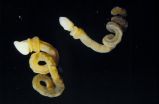(Press-News.org) Milk from goats that were genetically modified to produce higher levels of a human antimicrobial protein has proved effective in treating diarrhea in young pigs, demonstrating the potential for food products from transgenic animals to one day also benefit human health, report researchers at the University of California, Davis.
The study is the first on record to show that goats' milk carrying elevated levels of the antimicrobial lysozyme, a protein found in human breast milk, can successfully treat diarrhea caused by bacterial infection in the gastrointestinal tract.
The findings, slated to appear March 13 in the online scientific journal PLOS ONE, offer hope that such milk may eventually help prevent human diarrheal diseases that each year claim the lives of 1.8 million children around the world and impair the physical and mental development of millions more.
"Many developing parts of the world rely on livestock as a main source of food," said James Murray, a UC Davis animal science professor and lead researcher on the study. "These results provide just one example that, through genetic engineering, we can provide agriculturally relevant animals with novel traits targeted at solving some of the health-related problems facing these developing communities."
In this study, Murray and colleagues fed young pigs milk from goats that were genetically modified to produce in their milk higher levels of lysozyme, a protein that naturally occurs in the tears, saliva and milk of all mammals.
Although lysozyme is produced at very high levels in human breast milk, the milk of goats and cows contains very little lysozyme, prompting the effort to boost lysozyme levels in the milk of those animals using genetic modification.
Because lysozyme limits the growth of some bacteria that cause intestinal infections and diarrhea and also encourages the growth of other beneficial intestinal bacteria, it is considered to be one of the main components of human milk that contribute to the health and well-being of breast-fed infants.
Pigs were chosen for this study as a research model because their gastrointestinal physiology is quite similar to humans, and because pigs already produce a moderate amount of lysozyme in their milk.
Half of the pigs in the study were fed pasteurized milk that came from the transgenic goats and carried greater amounts of lysozyme — 68 percent of the level found in human breast milk. The other half of the pigs were fed pasteurized milk that came from nontransgenic goats and thus contained very little lysozyme.
The study found that, although both groups of pigs recovered from the infection and resulting diarrhea, the young pigs fed the lysozyme-rich milk recovered much more quickly than did the young pigs that received goats' milk without enhanced levels of lysozyme. Overall, the pigs fed the lysozyme milk were less dehydrated, had less intestinal inflammation, suffered less damage to the inner intestines and regained their energy more quickly than did the pigs in the control group. And, the researchers detected no adverse affects associated with the lysozyme-rich milk.
The lysozyme-enhanced milk used in this study came from a transgenic line of dairy goats developed in 1999 by Murray, co-author Elizabeth Maga and their colleagues to carry the gene for producing human lysozyme in their milk.
INFORMATION:
Other researchers on this study are: Caitlin Cooper, Lydia Garas Klobas and Elizabeth Maga, all of the UC Davis Department of Animal Science.
Funding for the study was provided by the UC Davis College of Agricultural and Environmental Sciences and the UC Agricultural Experiment Station.
About UC Davis
For more than 100 years, UC Davis has engaged in teaching, research and public service that matter to California and transform the world. Located close to the state capital, UC Davis has more than 33,000 students, more than 2,500 faculty and more than 21,000 staff, an annual research budget of nearly $750 million, a comprehensive health system and 13 specialized research centers. The university offers interdisciplinary graduate study and more than 100 undergraduate majors in four colleges — Agricultural and Environmental Sciences, Biological Sciences, Engineering, and Letters and Science. It also houses six professional schools — Education, Law, Management, Medicine, Veterinary Medicine and the Betty Irene Moore School of Nursing.
Media contact(s):
James Murray, Animal Science, (530) 752-3179, jdmurray@ucdavis.edu
Pat Bailey, UC Davis News Service, (530) 752-9843, pjbailey@ucdavis.edu
END
A one-sided cellphone conversation in the background is likely to be much more distracting than overhearing a conversation between two people, according to research published March 13 in the open access journal PLOS ONE by Veronica Galván and colleagues from the University of San Diego.
The authors studied the effects of overhearing either one side of a cell phone call or a chat between two people on the attention and memory of people who overheard these conversations. Participants in the study were asked to complete a task involving anagrams. As they performed the task, ...
Traveling into uncharted territory in search of food can be a dangerous undertaking, but some bottlenose dolphins may benefit by moving through their habitat with relatives who may be more experienced or knowledgeable. It turns out that leaders in bottlenose dolphin groups in the Florida Keys are more likely to be related to the dolphins that follow them, according to research published March 13 by Jennifer Lewis and colleagues from Florida International University.
In complex habitats like the shallow waters of the Florida Keys, individuals who follow may benefit from ...
DETROIT – Treating varicose veins with vein-stripping surgery is associated with higher costs than closing the veins with heat, according to a study at Henry Ford Hospital in Detroit.
"Cost-effectiveness is an important factor to consider when comparing different treatments for varicose vein disease," says Judith C. Lin, M.D., vascular surgeon and lead author of the study. "And these two types of treatment have similar effectiveness."
The study will be presented March 13 at the 41st Annual Symposium of the Society for Clinical Vascular Surgery in Miami.
The current ...
Initial vaccinations for human papillomavirus (HPV) at a young age is important for maximizing quadrivalent HPV vaccine effectiveness according to a Swedish study published March 13 in the Journal of the National Cancer Institute.
HPV vaccination programs have been launched around the world in hopes of preventing cervical cancer and other HPV-related cancers. While incidence of genital warts is the earliest possible disease outcome to measure the efficacy of the HPV vaccine, the results of such efficacy trials may not be fully generalizable to real-life HPV vaccination ...
HOUSTON -- (March 13, 2013) – Few things in life are inevitable – death, taxes, and, if you live long enough, osteoarthritis.
No treatment will stop or significantly slow the disease, and joint replacement is the only definitive treatment. That may change, however, as researchers such as Dr. Brendan Lee (http://www.bcm.edu/genetics/index.cfm?pmid=10940), professor of molecular and human genetics at Baylor College of Medicine (http://www.bcm.edu), and his colleagues unravel the effects of a naturally occurring protein called lubricin or Proteoglycans 4 that appears to ...
University of Montreal researchers found that changes in gravity affect the reproductive process in plants. Gravity modulates traffic on the intracellular "highways" that ensure the growth and functionality of the male reproductive organ in plants, the pollen tube. "Just like during human reproduction, the sperm cells in plants are delivered to the egg by a cylindrical tool. Unlike the delivery tool in animals, the device used during plant sex consists of a single cell, and only two sperm cells are discharged during each delivery event," explained Professor Anja Geitmann ...
Vitamin D supplements significantly reduced blood pressure in the first large controlled study of African-Americans, researchers report in the American Heart Association journal Hypertension.
In the prospective trial, a three-month regimen of daily vitamin D increased circulating blood levels of vitamin D and resulted in a decrease in systolic blood pressure ranging from .7 to four mmHg (depending upon the dose given), compared with no change in participants who received a placebo.
Systolic blood pressure, the top and highest number in a reading, is pressure in the arteries ...
The precise methodology of Richard Feynman's famous double-slit thought-experiment – a cornerstone of quantum mechanics that showed how electrons behave as both a particle and a wave – has been followed in full for the very first time.
Although the particle-wave duality of electrons has been demonstrated in a number of different ways since Feynman popularised the idea in 1965, none of the experiments have managed to fully replicate the methodology set out in Volume 3 of Feynman's famous Lectures on Physics.
"The technology to do this experiment has been around for about ...
Doctors at Yale School of Medicine and the American Academy of Neurology (AAN) have called upon their fellow physicians to limit or end the practice of prescribing memory-enhancing drugs to healthy children whose brains are still developing. Their position statement is published in the March 13 online issue of the journal Neurology, the medical journal of the AAN.
The statement was written to address the growing trend in which teens use "study drugs" before tests and parents request attention deficit hyperactivity disorder (ADHD) drugs for children who don't meet the ...
This press release is available in French.
Christopher Cameron of the University of Montreal's Department of Biological Sciences and his colleagues have unearthed a major scientific discovery - a strange phallus-shaped creature they found in Canada's Burgess Shale fossil beds, located in Yoho National Park. The fossils were found in an area of shale beds that are 505 million years old.
Their study, to be published online in the journal Nature on March 13, 2013, confirms Spartobranchus tenuis is a member of the acorn worms group which are seldom-seen animals that thrive ...


